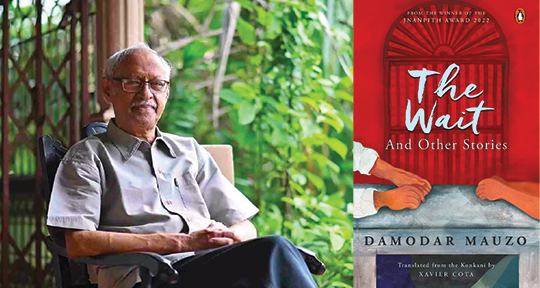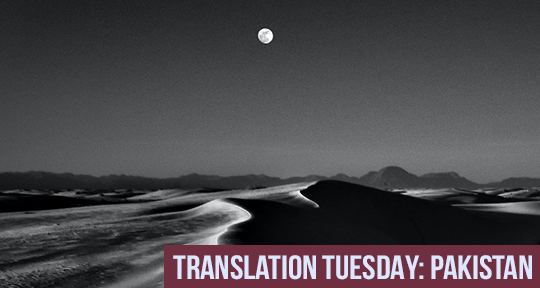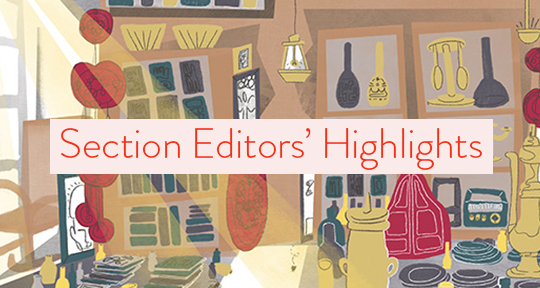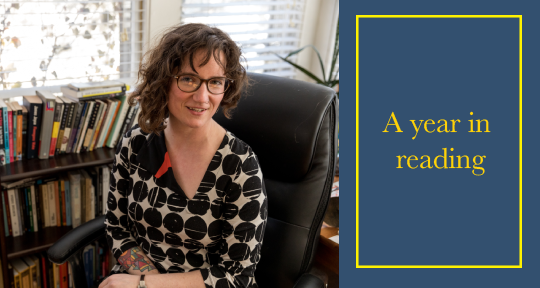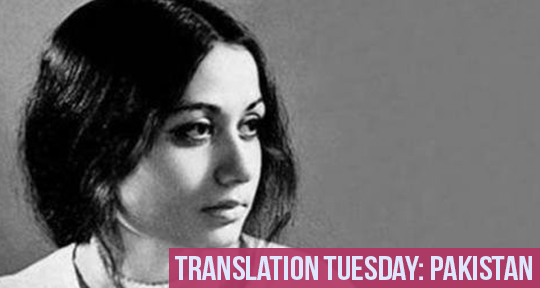For this week’s Translation Tuesday, a slice of rural life frames decades of a family’s history in this excerpt from Ali Akbar Natiq’s acclaimed novel, Naulakhi Kothi. We’re treated to an abridged biography of Maulvi Karamat, an imam at a small village mosque. Maulvi Karamat is heir to his patriarchs’ accumulated knowledge, which he bestows upon his dutiful (but much abused) son, Fazal Din. An arduous errand to collect food (and consequently, money) unfolds into a lively character study of a mother, a father, and a street savvy son. Natiq deftly contextualises the present by manipulating narrative time, weaving generations into concise pockets of exposition.
“Maulvi Karamat”
When Maulvi Karamat left home, he could barely walk straight. Every few minutes, he would lean his full weight on his staff, and had a sharp headache. He had developed a slight fever because of being on an empty stomach for long. At intervals, he felt a renewed bout of anger against Fazal Din, who had still not returned with the rotis. Maulvi Karamat was afraid he might fall while leading the prayer. It was hard to sustain oneself till Zuhar on the glass of sweet buttermilk he had had at Fajr. As a result, he wasn’t too sure of what he had recited during prayer. In fact, at one point, he had said one verse out of place. It was a good thing that Zuhar prayers were not recited aloud, otherwise, he would have suffered a lot of humiliation, and the attendees would have begun to doubt his sanity. Performing the motions of sujood, ruqooh, and qayaam, he swore at Fazal Din countless times, and also thought ill of the attendees behind him, who were content to line up in prayer behind him, but could not tell whether he was hungry or not. In this state, he thought of the hadith that said, ‘If the time for prayer conflicts with the time for a meal, take your meal first, for one cannot pray on an empty stomach.’
For the past thirty years, Maulvi Karamat was the head imam of this small mosque. More than a village, it was a small cluster of around fifty to a hundred houses. Maulvi Karamat’s great grandfather, Khudayaar, had come here first, seeking alms from people who lived here. At that time, this mosque was an empty and unmarked spot. He was the first to mark the precincts as his own by throwing his patched quilt of rags on the floor here, and started saying a prayer. At first, the villagers would give him two square meals out of pity. Then slowly, some more people, seeing the earlier ones, began to join him there for prayers. Khudayaar had spent a year attending religious lectures in an institution. As a result of that experience, he had memorised some verses of the Quran, and also knew how to pray. On the basis of this knowledge, he started performing his duties as imam, and declared himself the maulvi of the village. Little by little, the functions of the mosque began to shape up around this. After his death, Maulvi Karamat’s father, Ahmed Din, succeeded him. Since that day, from generation to generation, they had remained here. Showing great foresight, Ahmed Deen had taught Karamat a few initial books of the Quran, and sent him off to attend religious lectures in Qasoor. Maulvi Karamat spent six years here. By the time he was fifteen, he was fairly fluent in Urdu, Arabic, and Persian. During this time, Maulvi Karamat’s father, Ahmed Din, passed away at the age of sixty. After his father’s death, instead of going elsewhere, he had preferred to stay in this humble mosque at Chak Rahra. He was sixty-five years of age now.
READ MORE…



